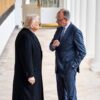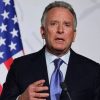 Newcastle United have secured early Champions League qualification with Dan Ashworth overseeing sporting operations. Photo: Getty Images/Serena Taylor
Newcastle United have secured early Champions League qualification with Dan Ashworth overseeing sporting operations. Photo: Getty Images/Serena Taylor
Growth That Dan Ashworth will lead what may be the biggest turnaround program at Manchester United since Sir Alex Ferguson began revamping it in late 1986 suggests a future The club's sporting director has reached the peak of his career.
The 52-year-old's progress since his first appointment as technical director in 2007 at West Bromwich Albion, through the Football Association, Brighton, Newcastle United and now to the country's most prestigious club, has been remarkable. Wealthy owners such as the Newcastle Public Investment Fund and Ineos billionaire Sir Jim Ratcliffe are willing to pay a premium for Ashworth's expertise. Nearly four decades after Ashworth's ambitions for a professional career ended with being rejected by Norwich City in 1988, he now earns the kind of salary and bonuses that a decent 2024 Premier League footballer would earn.
The role of the sporting director is fundamental to English football, with the world's wealthiest and most competitive top-flight clubs, as well as many leading Premier League clubs, part of a global multi-club system. Ashworth's scope of work in the employment sector was enormous. He oversees scouting, recruiting, training facilities, sports science, medical, academy, credit pathways, succession planning. In the FA (the only scandal that briefly affected his career) — and women's teams.
The job is huge — and it may be all the man at the top does. It's how Ashworth put it all together that makes him such a commodity.
Those who know him well and have worked with him say it's best explained by a series of big and small decisions he makes, all of which contribute to significant change. No one would argue that every choice he made was the right one, but his track record of improvement wherever he was made speaks for itself. Everything is calibrated so the machine runs smoothly, which improves performance at the very top: the first team.
 Ashworth during his stay at West Brom to introduce Steve Clarke as manager in 2012. Photo: Getty Images/Warren Little
Ashworth during his stay at West Brom to introduce Steve Clarke as manager in 2012. Photo: Getty Images/Warren Little
For example, at Brighton, where he joined in 2019 after leaving the FA, he reorganized scouting activities so that scouts were responsible for positions rather than territories. This changed the job completely, but meant that instead of being specialists in one country or region, they became global experts. They knew the market for one position and could compare players around the world (their fees and contract values).
It's a simple change in theory, but the results have been exceptional. Alexis Mac Allister, Moises Caicedo, Mark Cucurella and Roberto Sanchez's eventual promotion to the first team all flowed from this, as did the loan deal of Levi Colville from Chelsea. Brighton have maintained this model since Ashworth's departure.
In December 2014, he presented the England DNA document to the FA, drawing ridicule from a football public plagued by false dawns regarding the national team. The name may have been a little unoriginal, but the concept was transformative. There were several junior tournament victories, including two World Cups in 2017, and the start of the Gareth Southgate era, which changed the history of the senior team.
Ashworth tirelessly pushed for a new deal with clubs who did not want to let their best academy players go to national teams, which they felt was of no benefit. He banned England teams from participating in the Victory Shield, which had been running since 1946, arguing that they needed stronger opposition than the host nations. He has developed a new program of games against the big powers Brazil and Spain, whom England's senior team are likely to face at major tournaments.
He has appointed coaches for each age group specifically for those who own and not in possession of the ball, identifying this as a key development in understanding how boys should be coached. The FA made the announcement with some caution at the time, knowing it was likely to be met with ridicule. This is now standard and Brighton have adopted this measure in their academy.
 Ashworth was involved in the Brighton operation, in which bright talents are sold for huge fees. Photo: Reuters/John Sibley
Ashworth was involved in the Brighton operation, in which bright talents are sold for huge fees. Photo: Reuters/John Sibley
Ashworth was a young coach in the academies of Peterborough United, Cambridge United and then West Brom, where he rose to academy director in 2004. He received his UEFA professional license early on and worked in all aspects of the game beyond management. first team. He appointed managers and coaches and signed players from all age groups. He made deals and redesigned training grounds. The rise of analytics and the growing role of data in football came during his era.
It was impossible to be an expert in it all, but Ashworth showed that one person could build a comprehensive system that brought it all together. Especially when he was given St George's Park, the FA's new football centre, in 2012. Built in the deepest eastern part of Staffordshire, it had no regular players, but Ashworth recognized that English football was changing with the advent of the Elite Player Performance Plan and the FA could find a role.
He changed youth team coaches and pushed his new coaches to develop a shared vision of how England teams should play. He demanded continuous improvement in the methods of conducting coaching sessions and organizing camps for tournaments. He implemented a clear talent identification strategy that sought out players who were confident on the ball rather than those favored in the past who were simply more physical than their peers. He rewrote the FA coach education program.
He built around himself a successful team of coaches and specialists, many of whom achieved great success. England's youth managers at the time included Steve Cooper and Rob Edwards, who both started the season as Premier League managers. On the day the England DNA document was released, Ashworth was joined at the top table by Southgate, then under-21 manager and head of the FA's elite player development department, and Matt Crocker. The latter is now technical director of the US Soccer Federation, and Southgate has also had a good ten years.
 England coach Gareth Southgate together with Ashworth at the 2018 World Championships in Russia. Photo: Getty Images/Dan Mullan
England coach Gareth Southgate together with Ashworth at the 2018 World Championships in Russia. Photo: Getty Images/Dan Mullan
Ashworth's mantra was how a club or FA accurately assesses the results of a game by debriefing and then reworking the methods. improve. It was at the FA that he met Sir Dave Brailsford, the sporting director of Ineos, who was working as a consultant to the governing body.
It was the same in Brighton. Head of HR Paul Winstanley subsequently became one of Chelsea's two sporting directors. David Weir, Ashworth's deputy, became second in command. Brighton staff are in demand at all levels, including Matthew Green, who left to join Bayer Leverkusen as head of first-team scouting in emerging markets, and Will Abbott, who is now director of performance at Charlton Athletic. . Sam Jewell, son of manager Paul, is another Brighton recruiter created under Ashworth's leadership.
At Newcastle, he worked to develop a recruitment structure that matched the club's core ambitions, while also breathing new life into an academy that many felt had lost its way. Improvement was again rapid and last season's Champions League qualification under coach Eddie Howe was ahead of schedule.
 Ashworth with Eddie Howe flanked by Newcastle United youngster Elliot Anderson Photo: Getty Images/Serena Taylor
Ashworth with Eddie Howe flanked by Newcastle United youngster Elliot Anderson Photo: Getty Images/Serena Taylor
Ashworth tended to work with those staff he encountered, although those who resisted his way of working were sacked . He was approached by Manchester United shortly before he left Brighton for Newcastle in 2022 and turned it down because the role on offer was not senior to John Murtaugh, the de facto sporting director in recent years. He wants to do things his way and will seek such assurances from Ineos, knowing full well that none of the work he has done so far, even at the FA, will be subject to such scrutiny as in the case of Manchester United.< /p>

























































Свежие комментарии